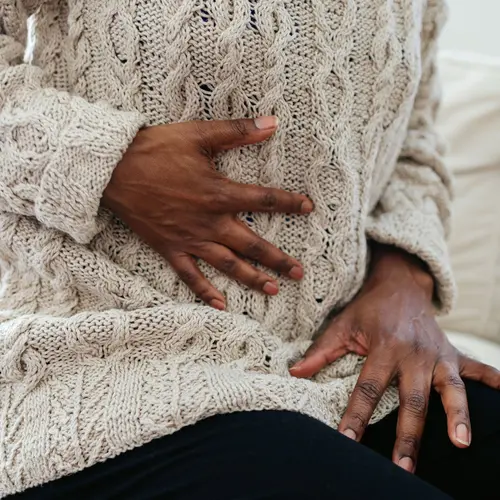Medication is usually the first option when treating ulcerative colitis (UC). Your doctor will choose the best drug for you, based on how severe your condition is and other factors. But it may come with side effects. Here’s what you need to know.
5-ASAs
These medications are also known as aminosalicylates. They lower inflammation in your digestive tract. They’re best for mild to moderate flares and can help you avoid relapses (when your symptoms come back). They usually come in tablets. But they’re also given rectally as an enema or suppository. Examples of 5-ASAs are:
- Balsalazide (Colazal)
- Mesalamine (Asacol HD, Delzicol)
- Sulfasalazine (Azulfidine)
Side effects are most common with sulfasalazine. They include:
- Nausea
- Headache
- Fever
- Rash
- Male infertility that can be reversed
When you first start this drug, you might also have:
- Appetite loss
- Sunlight sensitivity
- Nervousness
It’s rare, but sulfasalazine could also cause inflammation of your pancreas. Other uncommon symptoms include:
- An inflamed liver, kidney, or lung
- Stevens-Johnson syndrome, a serious allergic reaction
- Hemolysis, a disorder where red blood cells are destroyed faster than your body can make them
Other 5-ASA drugs generally have fewer side effects, compared to sulfasalazine. Common ones include:
- Headache
- A feeling of sickness
- Gas
- Cramps
- Less common side effects include:
- Skin rash
- Hair loss
- Worsened inflammation in your colon
Rarely, these drugs can cause inflammation in your lung, pancreas, kidney, or the tissue around your heart.
Corticosteroids
These anti-inflammatory drugs suppress your immune system. This means they keep your immune system from working the way it should. Corticosteroids are typically used to treat moderate to severe UC. You can take them orally or rectally. They can cause short- and long-term side effects, so you shouldn’t take them regularly. Types of corticosteroids include:
Because they suppress your immune system, corticosteroids can lead to infections. These include:
- Yeast infection in the mouth
- Yeast infection in female sex organs
- Urinary tract infections (UTIs)
Side effects that usually go away after you stop corticosteroids include:
- High blood pressure
- High blood sugar
- Weight gain
- Stretch marks
- Acne
- Growth interruption in kids
- More facial hair
- Trouble sleeping
- Mood swings
- Psychosis and other psychiatric symptoms
You could also get cataracts or osteoporosis (weakening of your bones). But they won’t just go away after you stop taking corticosteroids. Your doctor will have to treat these conditions.
Immunomodulators
These medications also suppress your immune system so it can’t cause more inflammation. They include:
- Azathioprine (Azasan, Imuran)
- Mercaptopurine (Purinethol, Purixan)
- Cyclosporine (Gengraf, Neoral, Sandimmune)
- Methotrexate paired with folic acid
Side effects of these drugs include:
- Nausea
- Headaches
- Diarrhea
- General feeling of sickness
- Canker sores
- Rash
- Fever
- Joint pain
- Liver inflammation
- Lowered kidney function
- Hepatitis
- Higher risk of infection
- Diabetes
- High cholesterol
- Sleep issues or fatigue
- Seizure
- High blood pressure
- Tingling in your fingers and feet
- More facial hair
- Low white blood cell count
Rare side effects include:
- Inflammation of the pancreas or lung
- Bone marrow suppression (when fewer blood cells are made in your bone marrow)
- Higher risk of lymphoma
- Scarring of your liver
Biologics
These medications are best for moderate to severe UC. They’re antibodies that stop certain proteins from causing inflammation. Biologics are made from natural substances. Examples include:
- Adalimumab (Humira)
- Golimumab (Simponi)
- Infliximab (Remicade)
- Ustekinumab (Stelara)
- Vedolizumab (Entyvio)
People who take biologics and have a history of hepatitis B could trigger the condition. So it’s important to get a blood test before starting these medications.
Other common side effects can include:
- A higher chance of infection
- Shortness of breath
- Chills
- Itchiness
- Redness
- Eye or lip itchiness
- Full body sensitivity or rash
Less common symptoms are:
- Sudden vision issues
- Numbness or tingling
- Swollen ankles or hands
- Shortness of breath
- Heart failure
- Lupus-like syndrome, which includes a rash across your face and arms that gets worse in the sun or new joint and body pain
JAK Inhibitors
JAK inhibitors, or Janus kinase inhibitors, suppress your immune system to block the JAK enzyme. This stops inflammation. You’ll take the JAK inhibitor tofacitinib (Xeljanz) by mouth to treat moderate to severe UC.
If you notice any side effects besides diarrhea, you should call your doctor right away. These can include:
- Black poop
- Bloody or cloudy pee
- A hard time peeing, painful/burning feeling while peeing, or frequently having to pee
- Pain in your bladder
- Blurry vision
- Aches or pains
- Chest tightness, pain, or a hard time breathing
- Cough
- Chills
- Fever
- Dizziness
- Ear congestion or pounding in your ears
- Headache
- Sensitive skin
- Loss of voice
- Pain in your lower side or back
- Nervousness
- Slower or faster heartbeat
- Sneezing
- Sore throat
- Stuffy/runny nose
- Swollen glands
- Fatigue or weakness
- Weight loss
- Yellow skin or eyes

